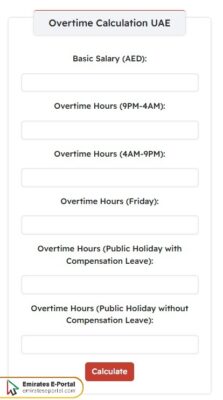
Overtime Calculator UAE – Updated for Labor Laws 2026
You can accurately calculate your overtime entitlements in the UAE using the following calculator:
Who is Eligible for Overtime Pay in the UAE
UAE Labor Law states that employees are normally entitled to pay for overtime hours worked beyond 8 hours in a working day or 48 hours in a working week. The exclusion of such entitlement is granted for managerial or supervisory positions, together with certain categories such as offshore or field-based workers. Aside from this, eligibility for such pay is also based on certain terms of the contract or company policies.
How to Calculate Overtime on Normal Working Days
The overtime during regular working days shall be paid at one hundred twenty-five percent of the basic hourly wage for the hours worked beyond the normal limit. To determine the hourly overtime rate: take the monthly basic salary & divide it by 30, then by 8, & multiply it by 1.25, which is in accordance with UAE labor law & ensures that extra working hours are rewarded accordingly.
Overtime Pay Rates for Night Shifts and Public Holidays
Employees working between 10 & 4 in the morning are entitled to 150% of their hourly wage unless working in shift jobs. For work on public holidays, overtime is payable at time & half or compensatory time off may be given. These particular rates exist to reimburse the inconvenience & extra effort put in at odd hours.
How to Use UAE Overtime Calculator
To use UAE overtime calculator, Just follow these easy steps:
- Write the basic salary in the designated field.
- Enter the number of overtime hours for each category in the designated space.

- Click on the calculate icon.
- View the result to know the value of the employee’s additional salary.
Benefits of Using an Overtime Calculator for Accurate Payroll
The following list highlights the many benefits of using an overtime calculator to accurately calculate employee salaries:
- Ensures Compliance with Labor Law: The overtime calculator helps ensure a company is compliant with UAE Labor Law by automatically applying correct rates for normal, night, & holiday hours, thus averting any legal ramifications or employee complaints.
- Reduces Payroll Errors: Manual computation often results in miscalculation of wages. Specialized calculators further reduce human error so that all overtime is computed properly and fairly among different categories of employees.
- Improves Payroll Transparency: Employees seeing how overtime calculations are performed through a clear tool creates trust and transparency throughout the payroll process; this, in turn, reduces inquiries and increases their satisfaction.
- Save Time and Resources: Automating overtime computation with such a tool will facilitate creating payroll, saving the HR department some precious time and energy every month, especially in larger organizations.
- Better Budget Forecasting: Tracking overtime costs with precision allows a company to gain deeper insights into labor expenses, which, over time, allows better budget forecasts and management of the workforce.
Real-Life Example of Overtime Calculations in the UAE
Assume an employee whose monthly base pay is AED 6,000 working two extra hours on a weekday. First we calculate the hourly wage: 6000 ÷ 30 ÷ 8 = AED 25.00. Now applying the overtime rate of 125%, we get: 25 × 125% = 31.25. For two hours, overtime pay is 62.50 for that day.
Understanding UAE Labor Law on Overtime Limits and Caps
UAE Labor Law put overtime under limitation, restricting it to two hours per day, for the safety of the employee. In total, including overtime, actual working hours must not exceed 144 hours in 3 weeks; or, at least, that is a cap that has been put into place to ensure an individual is not overworked & that the employer gives fair compensation for the overtime work should it occur. Should these caps be violated, penalties or even payment may be ensued under the law.
Common Mistakes Employers Make in Overtime Calculations
The following list shows common mistakes employers make in overtime calculations:
- Using the Total Salary Instead of the Basic Salary: A common mistake is using the gross salary to calculate the overtime. According to UAE law, overtime is to be calculated by reference to basic salary only, therefore excluding allowances and bonuses.
- Ignoring the Daily Does of Time Limitations and the Weekly Time Limit: Certain employers overlook the maximum legal limit of two hours of overtime per day and the weekly time limit, thus risking violations of labor law and exposure to fines or complaints from workers.
- Wrong Night Shift Pay: The failure to pay at 150% the salary for work rendered at night shift hours of 10 PM to 4 AM is a very common occurrence and attracts violations, especially for pay rendered to non-shift workers.
- Misclassification of Work Done on Public Holidays: Misclassification of public holiday work as overtime often leads to under-compensation. In addition to compensating at a higher rate, either paid or compensatory time off for working a statutory holiday is also enforceable by law.
- Inadequate Documentation: Not documenting overtime requests, orders, or hours can create disputes. There needs to be a reliable way of recording and storing overtime records for payroll and legal purposes.
Questions & Answers
The overtime rate in the UAE on regular working days is 1.25 compared to the regular working hour.
Overtime in the UAE on public holidays is calculated at 1.50 compared to the regular working hour.
The maximum daily overtime rate in the UAE is two hours after the daily working hours.
